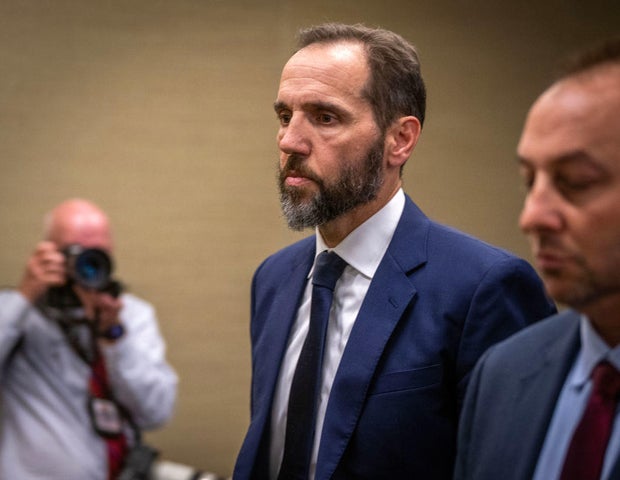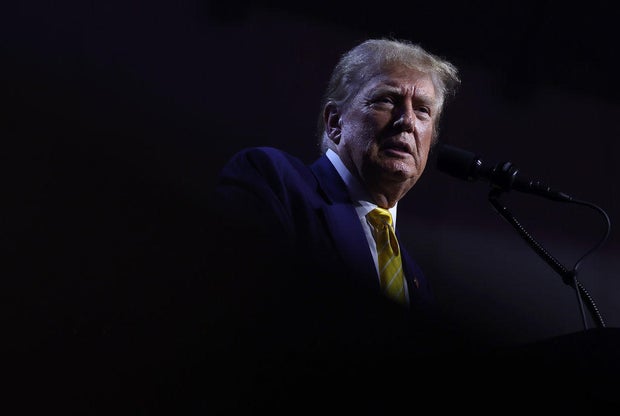[ad_1]
Washington — The federal judge overseeing special counsel Jack Smith’s classified documents case against Donald Trump once again rejected requests by the former president’s legal team to dismiss the charges against him, according to an order filed Monday evening.
Judge Aileen Cannon denied numerous claims by Trump’s defense attorneys and his co-defendants arguing the 2023 indictment was technically flawed, but she criticized prosecutors’ description of one incident as unnecessary to the charges and agreed to strike a single paragraph from the charging document because she said it “improperly contained uncharged offense allegations.”
Smith charged Trump with 40 counts that include the unlawful retention of national defense information after investigators recovered hundreds of classified documents from his time in the White House at his Florida estate. The former president and his co-defendants — aide Walta Nauta and former Mar-a-Lago employee Carlos de Oliveira — are also accused of engaging in an alleged scheme to obstruct the federal probe.
All three have pleaded not guilty and denied wrongdoing.
Smith’s office declined to comment on the recent ruling. Trump’s representatives did not immediately respond to a request for comment.
Bill O’Leary/The Washington Post via Getty Images
Trump, Nauta and de Oliveira made numerous arguments to the court in their bid to dismiss the charges before going to trial, including that several alleged crimes were listed under a single charge and that prosecutors failed to show Nauta and de Oliveria knew classified documents were contained in the boxes they are accused of moving. The defense also claimed the form in which the charges were written was technically insufficient.
Cannon rejected those claims because she said the language in the indictment was legally permissible. In some circumstances, she wrote the issues could be raised by the defense at trial.
Although a near-total win for Smith, the judge’s ruling also criticized the style of the special counsel’s indictment as containing “nonessential allegations more akin to a narrative about the government’s theory of prosecution.” Cannon wrote the “speaking indictment” — a term used to describe a descriptive charging document — contained allegations and language against Trump that were “legally unnecessary” to the underlying charges.
Despite the critique, she ruled nearly all of the 60-page indictment would stand, except for a single paragraph in which prosecutors described a moment in 2021 when Trump allegedly showed an individual who did not hold a security clearance a classified map of a foreign nation.
Justin Sullivan/Getty Images
The judge wrote that the paragraph was unnecessary and would be stricken from the indictment, as Trump is not charged with showing anyone else classified records. She did, however, leave open the possibility that the alleged conduct could be included in any trial after proper litigation.
Her ruling was in line with comments she has made in past court hearings in which she specifically called the charging documents against Trump a “speaking indictment” and noted its length.
Cannon’s order on Monday also mirrored others published in recent months in which she rejected Trump’s legal arguments, but wrote critically of the special counsel and his prosecutors.
In April, she agreed with Smith that the names of potential witnesses should remain redacted in publicly filed documents, but scolded prosecutors for not making that particular argument sooner. Last month, Cannon criticized Smith’s team for failing to confer with the defense and described them as “wholly lacking in substance and professional courtesy” when she rejected their request to limit Trump’s speech about law enforcement on the case. Cannon did, however, allow the special counsel to refile his request and she is still considering it.
A trial date in the case has yet to be set as the judge said she is working through other pretrial matters. Cannon previously rejected other arguments brought by Trump that the charges should be dropped and has set public hearings on various motions throughout the summer months.
Smith also charged Trump in Washington, D.C., with four federal counts alleging he worked to subvert the results of the 2020 presidential election. The former president pleaded not guilty to those charges and the case is presently on hold as the Supreme Court considers his claims of presidential immunity from prosecution.
[ad_2]
Source


